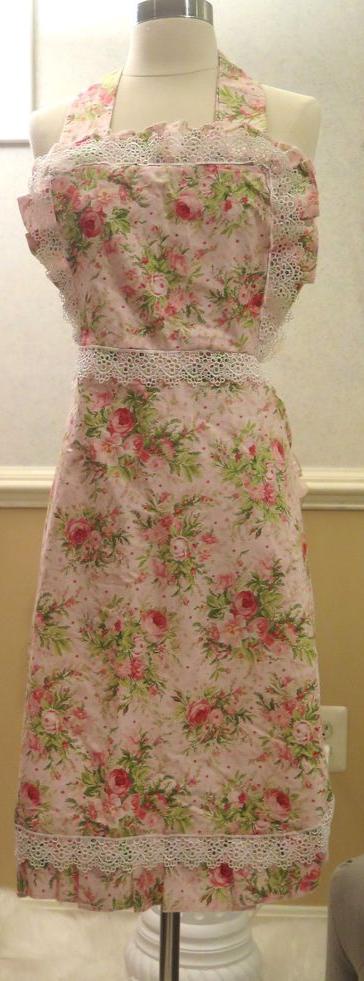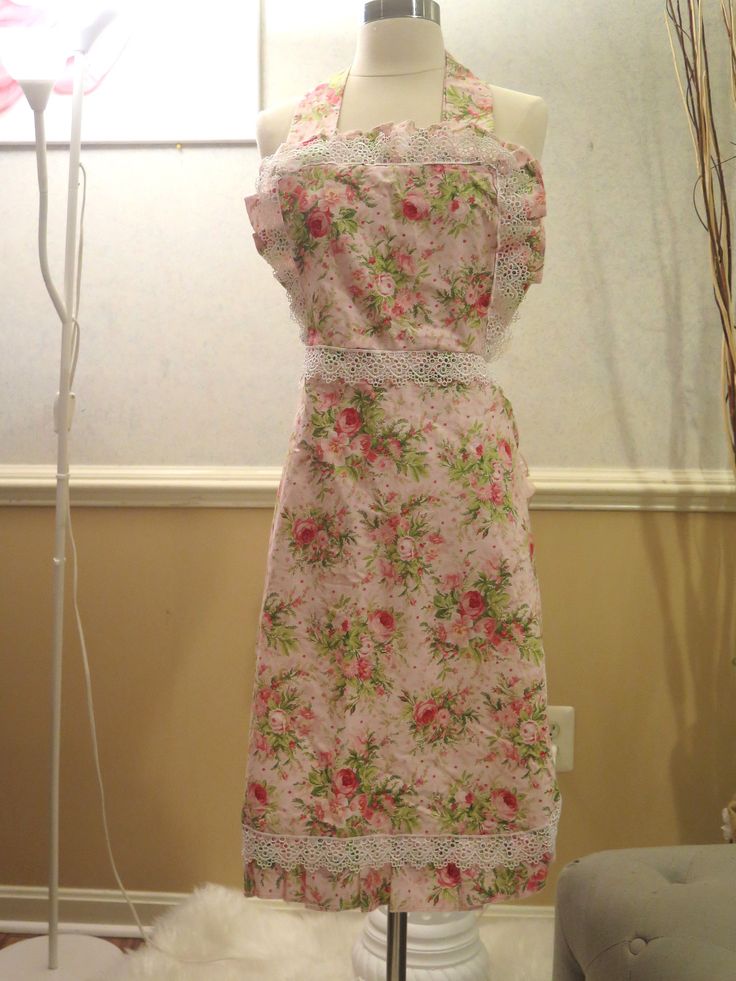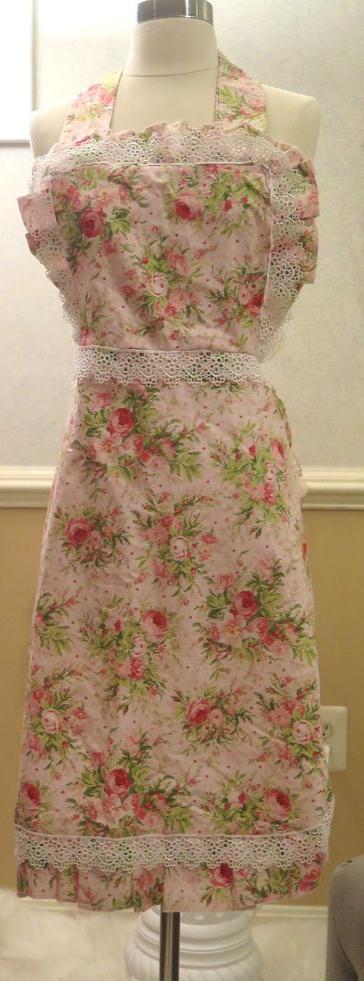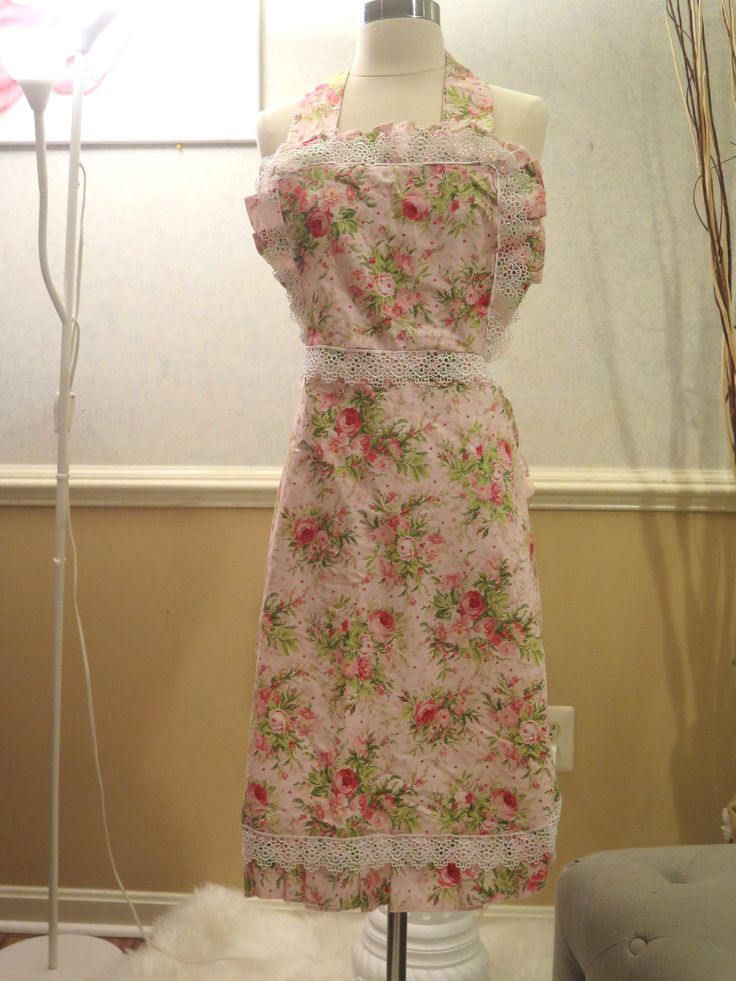NESY
Floral Apron/ Floral Pink Apron/ Kitchen Apron/ Designer Apron
Floral Apron/ Floral Pink Apron/ Kitchen Apron/ Designer Apron
Couldn't load pickup availability
Embrace timeless elegance with our Vintage Pink Floral Apron, beautifully designed for the modern homemaker with a love for classic style. Crafted from a delicate pink floral print, this apron brings a touch of vintage charm to your kitchen or crafting space. The apron is lined with intricate lace detailing along the edges, adding a soft, feminine finish that enhances its overall elegance.
Perfectly blending beauty and functionality, this apron offers full coverage, protecting your clothes while keeping you looking stylish. The adjustable neck strap and waist ties ensure a comfortable fit, while the lightweight fabric makes it ideal for all-day wear. Whether you're baking up a storm or hosting a dinner party, this vintage floral apron with its lace accents is sure to make you feel both stylish and sophisticated.
Elevate your kitchen attire with this graceful, vintage-inspired piece. Checkout our exquisite collection of flowers designed to elevate your living room and bring charm to your home. Plus, explore our stylish fashion accessories crafted just for you! Browse all of our products and find the perfect pieces to enhance your kitchen and your wardrobe. Shop now.
WHO NEEDS AN APRON?
Aprons are used by a variety of people across different industries and activities for protection, hygiene, or to carry tools and materials.
- Chefs and Cooks – To protect their clothes from spills, stains, and heat while cooking.
- Bakers – For protection from flour, dough, and other baking materials.
- Artists – To keep paint, clay, and other materials off their clothing.
- Gardeners – To carry tools and protect their clothes from dirt and plant matter.
- Baristas and Bartenders – For carrying towels, notepads, and protecting from spills.
- Hairdressers and Barbers – To avoid getting hair and dye on their clothes.
- Housekeepers – To carry cleaning tools and avoid cleaning products from soiling their clothes.
- Butchers – To stay clean while handling raw meat and other products.
- Woodworkers and Craftspersons – For carrying tools and keeping wood dust and materials off their clothing.
- Blacksmiths – To protect against heat, sparks, and grime from forging.
- Retail Workers (Florists, Craft Stores) – Often wear aprons to carry tools, pens, and to protect clothes while working.
SIMILAR ITEMS
OTHER ITEMS AVAILABLE
USES OF APRON
1. Protection
- Clothing Protection: Shields clothes from stains, spills, dirt, and chemicals. Useful in kitchens, workshops, and while gardening.
- Heat Protection: Thick aprons (e.g., in kitchens or for blacksmiths) can provide a barrier against heat, splashes, or sparks.
- Chemical Protection: In laboratories or cleaning jobs, aprons protect against harmful substances.
2. Hygiene
- Food Safety: In cooking or food preparation, aprons help prevent cross-contamination between clothing and food.
- Medical Use: Healthcare professionals use aprons to maintain hygiene when working with patients, preventing the spread of germs.
3. Convenience
- Storage: Aprons often have pockets to hold tools, pens, cloths, or other small items, keeping essentials handy for the wearer. This is useful for chefs, artists, and handymen.
- Tool Management: In workshops, aprons help carry and organize tools, screws, nails, or other small equipment.
4. Identification and Uniform
- Professionalism: In many settings like restaurants, cafes, or salons, aprons are part of a uniform, distinguishing employees and giving a professional appearance.
- Branding: Aprons with logos or custom designs can promote a business or brand.
5. Safety
- Barrier Against Sharp Objects: Some aprons, such as those worn by butchers or welders, are made from durable materials that protect against cuts or abrasions.
- Fire and Heat Resistance: Specialized aprons, like those used in welding or blacksmithing, protect against sparks, hot metal, and fire.
6. Fashion and Style
- Fashion Accessory: In some creative fields or even at home, aprons are designed for aesthetic appeal, adding a stylish element to an outfit.
- Customizable: Aprons can be personalized or themed for events, holidays, or celebrations (e.g., custom aprons for baking during holidays).
7. Cultural or Ceremonial Use
-
Traditional Aprons: In some cultures, aprons have a symbolic or traditional significance, worn during specific ceremonies or events.
8. Eco-Friendly Cleaning
-
Reusable Barrier: Using an apron while cleaning reduces the need to wash other clothes as frequently, making it more eco-friendly by saving on water and detergent.
CARE
1. Read the Care Label
-
Always check the manufacturer's instructions on the care label for specific cleaning and care guidelines. Some aprons, especially those made from specialty fabrics, may have unique requirements.
2. Washing Instructions
-
Cotton or Polyester Aprons:
-
Machine wash in warm or cold water to avoid shrinkage.
-
Use a mild detergent to avoid damaging the fabric or causing fading.
-
Avoid bleach unless the apron is white, as it can damage colored fabrics.
-
-
Denim or Heavy-Duty Aprons:
- Wash in cold water to prevent color fading and shrinkage.
- Turn inside out before washing to protect any decorative elements, like rhinestones, beads, or embroidery.
-
Leather Aprons:
- Wipe down with a damp cloth using a mild soap solution. Do not submerge in water.
- Use a leather conditioner regularly to keep the material supple and prevent cracking.
-
Heat-Resistant or Waterproof Aprons:
- Wash with cool water and let air dry.
- For waterproof aprons, avoid fabric softeners, as they can damage the water-resistant coating.
3. Drying
- Air Dry: It’s best to air dry most aprons by hanging them up after washing. This helps prevent shrinking and maintains the apron’s shape.
- Tumble Drying: If you’re using a dryer, choose a low heat setting to avoid shrinking or damaging the fabric.
- Avoid Direct Sunlight: If air is drying outside, avoid prolonged exposure to direct sunlight, which can cause colors to fade.
4. Stain Removal
- Immediate Action: Treat stains as soon as possible to prevent them from setting. Use a stain remover or soak the stained area in cold water before washing.
- For Oil/Grease Stains: Apply a small amount of dishwashing liquid to the stain before washing.
- For Tough Stains (e.g., paint, food dyes): Use a specific stain remover product for the type of stain (e.g., a solvent-based cleaner for oil paint).
5. Ironing
- Cotton or Fabric Aprons: Use a medium heat setting on an iron. For aprons with prints or embellishments, iron inside out to avoid damage.
- Denim Aprons: If needed, iron on a low heat setting to smooth out wrinkles.
- Leather Aprons: Do not iron leather. Instead, smooth out wrinkles by gently massaging and conditioning the leather.
6. Storage
- Hang It Up: Store your apron on a hook or hanger to prevent wrinkles and keep it in easy reach for use.
- Fold Properly: If you prefer folding, make sure it’s folded neatly to avoid unnecessary creasing.
- Keep It Dry: Store your apron in a dry, well-ventilated area to avoid mold or mildew, especially if it’s made of leather or waterproof materials.
7. Maintain Decorative Elements
- Embellishments (Beads, Rhinestones, etc.): If your apron has decorative elements, wash it inside out on a gentle cycle or hand wash it to avoid damaging these elements.
- Reinforce Loose Parts: Check regularly for any loose buttons, straps, or decorative items and sew them back on to avoid losing them.
8. General Care Tips
- Avoid Overwashing: Don’t wash the apron more than necessary. Spot clean whenever possible to extend the fabric’s life.
- Rotate Aprons: If you use aprons frequently, rotating between a couple of aprons can reduce wear and tear on a single one.
Copyright ©Nesy
Share




